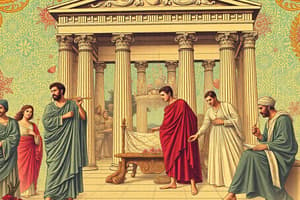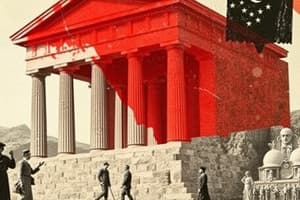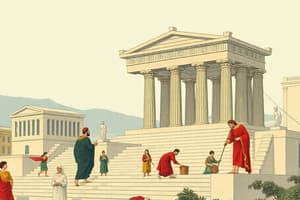Podcast
Questions and Answers
What was a key feature of Athenian democracy?
What was a key feature of Athenian democracy?
- Inheritance of political power
- Direct voting on public policy (correct)
- Dictatorship by a single ruler
- Representation by elected officials
Who were excluded from participating in Athenian democracy?
Who were excluded from participating in Athenian democracy?
- Some freedmen and foreigners
- All free adult males
- Foreigners and slaves
- Children and women (correct)
Which event was NOT part of the original Olympic Games?
Which event was NOT part of the original Olympic Games?
- Chariot racing
- Wrestling (correct)
- Running
- Pankration
What were the Olympics initially held to celebrate?
What were the Olympics initially held to celebrate?
Which area did the ancient Greeks significantly contribute to in terms of human thought?
Which area did the ancient Greeks significantly contribute to in terms of human thought?
What was a significant contribution of ancient Greeks to Western civilization?
What was a significant contribution of ancient Greeks to Western civilization?
Which form of government was most prevalent in ancient Greek city-states?
Which form of government was most prevalent in ancient Greek city-states?
Which Greek city-state was known for being an empire?
Which Greek city-state was known for being an empire?
What architectural feature was commonly found in Greek buildings?
What architectural feature was commonly found in Greek buildings?
Which famous philosopher was a student of Socrates?
Which famous philosopher was a student of Socrates?
Which city-state was known for its oligarchic form of government?
Which city-state was known for its oligarchic form of government?
What influenced many aspects of European society according to the text?
What influenced many aspects of European society according to the text?
Flashcards are hidden until you start studying
Study Notes
Ancient Greece
The ancient Greeks lived from 800 BCE to 146 BCE. They were known for their significant contributions to philosophy, architecture, art, democracy, and sport, particularly through the Olympic Games. These achievements laid the foundation for Western civilization.
Athenian Democracy
Athenian democracy was one of the first known democratic governments. It allowed citizens to vote directly on public policy. This system was established in the city of Athens around 507 BCE. Key features included:
- Citizens had equal political rights.
- All free adult males could participate.
- Decisions were made by majority rule.
Despite these civil liberties, there were still restrictions. Women, children, slaves, foreigners, and some freedmen were excluded from participating. Also, some decisions required a supermajority.
Olympic Games
The Olympics began as religious festivals held every four years in Olympia, a rural area near the western coast of the Peloponnese. The first recorded games took place between 776 BCE and 77 BC. Initially, athletes competed in events like running, discus throwing, javelin throwing, boxing, pankration, and equestrian events. Over time, the Olympic Games expanded to include wrestling, athletics, horse racing, chariot racing, and combat sports.
Greek Philosophy
Greek philosophers contributed greatly to human thought, developing ideas on logic, ethics, metaphysics, politics, epistemology, rhetoric, and aesthetics. Some notable figures include Socrates, Plato, Aristotle, and Pythagoras. Their teachings influenced many aspects of European society.
Architecture and Art
Greek architects and artists created works renowned for their beauty and grandeur. Their buildings featured intricate designs, columned structures, decorative friezes, and elaborate sculptures. Notable examples include the Parthenon and the Acropolis.
Empire vs City States
In ancient Greece, three main forms of government existed: oligarchy, tyranny, and monarchy. However, most Greek city-states were independent, ruled by a council of elders who consulted with other influential members of society. Only Sparta and Macedonia emerged as empires. Sparta was governed by two kings, while Macedonia's ruler was called a king.
Oligarchy
Oligarchies were ruled by a small group of elite citizens usually based on wealth or birth. Examples of city-state oligarchies include Corinth and Chalcidice.
Tyranny
Tyrannies were ruled by a single person who seized power through force. Examples included Pheidon of Argos and Periander of Corinth.
Monarchy
Monarchies were ruled by a hereditary king. Sparta's rulers were ephors elected from among the kings.
These forms of government influenced the balance of power in Greek society, shaping its culture and political landscape.
Studying That Suits You
Use AI to generate personalized quizzes and flashcards to suit your learning preferences.




